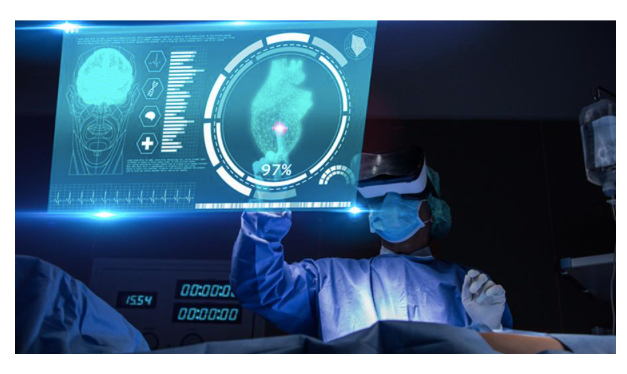Healthcare Potential In Metaverse …. How I Explained To My Grandma
By: Ahmed El Abd, Founder and Senior Managing Director, O Health
Still, metaverse as the definition is an intangible for many of us, even for the new millennial the topic is still debatable.
But as simple as “ we meet each other on the internet ‘, build communities, and definitely there will be a place for health, medicines, and maybe surgical operations
So The metaverse, like telemedicine and mobile device integration before it, has the potential to be a significant technological game-changer in healthcare.

The metaverse’s potential is rising extensively since it combines (VR) and (AR) technologies to function in virtual spaces so now you can see and feel the experience
All evidences led to the broad adoption of the metaverse as a disruptive shift in healthcare, including better surgical intervention, therapeutics use, social-distancing accommodations..etc
The metaverse is a parallel world or visual depiction of reality, but it is not augmented reality (AR), virtual reality (VR), or mixed reality (MR), but rather a hybrid of these technologies that add artificial intelligence.
The metaverse is the result of the convergence of these three main technology trends, each of which has the potential to affect healthcare in its own way.
Together, though, they have the potential to develop totally new channels for delivering treatment, potentially lowering costs and significantly improving patient outcomes.
Telepresence (enabling individuals to be together digitally even while they are physically separated), digital twinning, and blockchain are a few examples (and its ability to let us create a distributed internet). Nonetheless, with these advancements come new problems that will reshape modern healthcare as we know it.
The metaverse represents a paradigm shift in healthcare that stakeholders must be aware of, from ensuring seamless integration across the current medical infrastructure to balancing starting costs and data security/privacy problems.

The metaverse, also known as Internet 3.0, is an advancement in how people may socially engage with one another despite geographical distance and regional barriers.
The Metaverse is poised to usher in a disruptive revolution in many areas of life, including healthcare.
For many decades, healthcare delivery required physical interaction between a patient and a doctor in order to make a diagnosis, receive medical treatment, or perform surgical procedures, among other things; this has changed significantly with the introduction of telehealth services, which have become a part of the patient-doctor interaction via digital means and the Internet. However, with AR&VR technology enabling previously imagined possibilities, digital health solutions are on the cusp of becoming unprecedentedly bigger and more voluminous.
According to Market Research Future, the global healthcare in metaverse market is expected to grow from USD 504.8 million in 2024 to USD 5,373 Million by 2030 and register a staggering CAGR of 48.3% during the forecast, 2024 to 2030.
Source: MRFR Analysis
Healthcare in Metaverse market dynamics
The expanding popularity of telemedicine, the usage of AR/VR/AI for performing minimal-invasive procedures, and the growing use of digital twins in healthcare are just a few of the factors driving the growing interest in the healthcare in metaverse market. Furthermore,
The capacity to assist mental health within the metaverse, as well as transform medical education and training with immersive 3D applications, and the emergence of a metaverse in surgical sectors, emphasize the expanding benefits of healthcare in the metaverse market.
Whereas growing concerns about privacy and security, as well as the exorbitant cost of implementing new technology, are hindering industry growth.
Furthermore, adjusting business models to new HIPAA requirements for the healthcare metaverse, as well as user uptake of healthcare in the metaverse market, provide industry obstacles.
Healthcare in Metaverse Market Driver
- Growing Use of Digital Twins in Healthcare
In medicine, digital twins may collect vast volumes of patient scan data (MRI, CT, ultrasound scans) over time and combine it into a single perspective to plan procedures and track disease development and therapy.
Healthcare in Metaverse market opportunity
- Metaverse to Support Patient’s Mental Health
The metaverse poses intriguing mental health problems, such as addiction to virtual worlds, harming persons suffering from mental diseases such as psychosis, schizophrenia, sadness, or anxiety, and revolutionizing mental health therapy entirely. Metaverse in mental health can be used to treat phobias, PTSD, anxiety disorders, hallucinations, and delusions, among other things.
- Privacy and Security Concerns in Metaverse
In the Metaverse, patients’ personal information is also an issue. When merging the Metaverse into healthcare, additional challenges must be addressed. Due to the fact that hackers usually target high-value and vulnerable targets.





